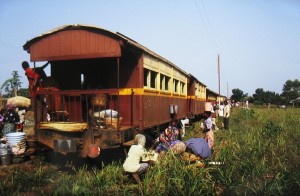Transport

|
ECOWAS has put in place a robust transport programme meant to facilitate the movement of persons, goods, and services in the region. This will undoubtedly lead to greater integration in line with the development policy of the community. Before today, the Air and Rail sub-sectors had been poorly utilised by ECOWAS. However, even these are now being rapidly developed. The rail sector has become a trail blazer in the desire to develop the transport infrastructure within ECOWAS. So, in the West Africa Rail Master-Plan, the main focal point today includes the birth of detailed engineering studies of the Kaya-Dory-Niamey link connecting the Abidjan-Ouagadougou railway line to the Republic of Niger which has been initiated with funding from the European Union. Besides, there is also funding assistance of infrastructure projects including the construction of three bridges in Sierra Leone, the finalisation and operation of Joint Border Posts as well as the facilitation of soft projects in conjunction with the UEMOA Commission. In the Air sub-sector, the Community is effectively engaging its Air Transport Action Plan (2009 -2015) to bring into fruition, some recent air transport projects include fostering the implementation of the Yamoussoukro Decision for air transport liberalisation, strengthening of aviation safety and security, promoting a viable airline industry in ECOWAS region as well as the implementation of ECOWAS air transport flagship projects. Today, air service agreements with third parties, aeronautical cooperation and financial resource mobilisation are being negotiated. Of great importance in this regard is the ECOWAS/UEMOA Yamoussoukro decision of July 2013. Heads of state and government have also since their July 2013 summit in Abuja decided to fast track the implementation of the decisions arising there from. Additionally, following a seminar in Niamey, the concept of Man Portable Air Defence Systems (MANPADS) is being looked at in response to persistent terrorist threats to civil aviation in the area. As for ground transport system, the road sub-sector which is the most utilised within the region, is now witnessing tremendous development. The principal activity in the roads sector is the continued implementation of regional road transport and transit facilitation programme. Under this programme, emphasis is placed on the ECOWAS Joint Border Posts (JBP) programme which has seen the construction of Joint Border Posts in Seme/Krake (Nigeria/Benin) and Noepe (Ghana/Togo) and the drafting of the Legal Framework and Operational Manuals for the JBP which will guide the operation of the various JBP facilities. There is also the Axle Load Harmonisation Policy, the Road Transport Observatory and the Nigeria-Cameroon Multinational Highway and Transport Facilitation Programme developed as part of the Trans-Africa Highway programme under which harmonisation of norms, standard, vehicle size, axle load limit between Nigeria (in ECOWAS) and Cameroon in the Economic Community of Central African States (ECCAS) is being studied to be followed by implementation. Similarly, we now also have the Lagos-Abidjan Corridor Development Programme as well as the Trans-Gambia Transport Corridor. |



